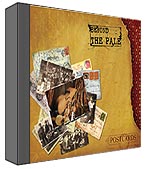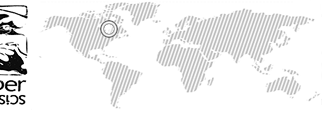With roots in the doomed world of Eastern European Jewry, contemporary klezmer music can carry a whiff of sad nostalgia. In the right hands, however, there's nothing morose about Yiddish party music.
Raucous rhythms, unabashedly emotional melodies and improvisational flights make klezmer an ebulliently expressive style with something to say to the New World. Two brash ensembles performing in the Bay Area in the coming days offer highly personal spins on Yiddish culture with very different responses to the Jewish experience in North America.
Beyond the Pale, a Toronto klezmer ensemble with a kinetic sound drawing on jazz, reggae, Gypsy swing and Brazilian grooves, makes its Bay Area debut Sunday at Berkeley's
Freight & Salvage and Monday at Don Quixote's in Felton. Inspired by David Grisman's stylistically expansive dawg music, mandolinist Eric Stein assembled a fascinating cast, including bassist Bret Higgins, Dutch-born clarinetist Martin Van de Ven, and Serbian musicians Aleksandar Gajic on violin and Milos Popovic on accordion."I really love Grisman's style of acoustic fusion," Stein says. "When I first got into klezmer, I started picking apart old recordings, reading old manuscripts from folk song collections. I absorbed them and churned them together with the rock, reggae and funk that I grew up with, through the prism of my Jewish identity.
"We're really trying to express ourselves and maintain klezmer's integrity, but we're not fetishizing tradition. We're about creating something using folk styles as raw material, whether Jewish, Serbian or Dutch."
Since coming together in 1998, Beyond the Pale has released three CDs, including last year's "Postcards" (Borealis), which features impressive original compositions and beautifully wrought arrangements of traditional tunes. Part of what makes the group's music so bracing is the cultural conversation at its core. The Serbian contingent (a sixth band member, percussionist/violinist Bogdan Djukic, couldn't make the tour) is steeped in Gypsy and Balkan traditions, which constantly intermingled with Jewish music in the region before the Holocaust.
"The Serbian players understand Jewish music on a level much deeper than a lot of Jews that I know in North America," Stein says. "That music comes from Eastern Europe. When I think about Bogdan's bow hitting the string, he has a tone and inflection that's very unself-consciously speaking with a Jewish accent. Balkan, Jewish and Gypsy music intermingled for centuries.
"It's funny. I'll bring in a Jewish tune, and they say, 'Hey wait a second,' and play a Serbian version."
If Beyond the Pale whets your appetite for Yiddish sounds, the KlezCalifornia Yiddish Culture Festival — Feb. 12-15 at Palo Alto's Congregation Etz Chayim — offers an opportunity for a weekend of immersion. The event features a series of participatory opportunities, from studying with master klezmer musicians to learning Yiddish dancing and songs. The festival also explores some of the same cultural crosscurrents as Beyond the Pale, highlighting the deep but often overlooked ties binding Jewish, Balkan, Roma and Greek communities.
The weekend's musical highlight is the premiere of "The Klezmer Shul," a four-part instrumental suite by Veretski Pass, the celebrated klezmer trio. The KlezCalifornia performance takes place Feb. 14 at Congregation Etz Chayim, followed by an audience discussion and a traditional klezmer dance party.
Formed six years ago by violinist Cookie Segelstein, Joshua Horowitz on accordion and tsimbl (hammer dulcimer) and Stu Brotman on bass and baraban (drums), Veretski Pass takes its name from the birthplace of Segelstein's father, a Carpathian Mountains pass where the Ottoman and Austro-Hungarian empires bumped up against each other for centuries. Like Beyond the Pale, Veretski Pass takes a scholarly approach to developing repertoire, but rather than bringing in far-flung influences, the group reinvents klezmer by distilling its essence.
"The Klezmer Shul" is a cultural experiment of a different sort, blending the sacred and profane. While klezmer music is thought of as inherently secular, designed for post-mitzvah parties, there's a long history of cross-pollination between the cantorial music of the synagogue and the dance music played at weddings and other celebrations.
"Many of the klezmer melodies come from synagogue tunes," says Judy Kunofsky, who launched KlezCalifornia with her husband in 2003. "The secular and the religious mingle together in a way that many Jews don't realize. Those cantorial modes informed klezmer and also drew from surrounding Greek, Turkish, Gypsy and Romanian communities."
Beyond the Pale
When: 7:30 p.m. Monday
Where: Don Quixote"s Music Hall,
6275 Highway 9, Felton
Tickets: $10, www.don
quixotesmusic.info
Also: 8 p.m. Sunday, Freight & Salvage, 2020 Addison St., Berkeley. $18.50, www.thefreight.org
Veretski Pass
When: 8 p.m. Monday
Where: Temple Israel, 3183 McCartney Road, Alameda
Tickets: $15-$18, 510-522-9355, www.klezcalifornia.org
Also: 8 p.m. Wednesday, Congregation Netivot Shalom, 1316 University Ave., Berkeley, $15, 510-549-9447, and 8 p.m. Feb. 14, Congregation Etz Chayim, 4161 Alma St., Palo Alto, $10-$20, 415-789-7679


